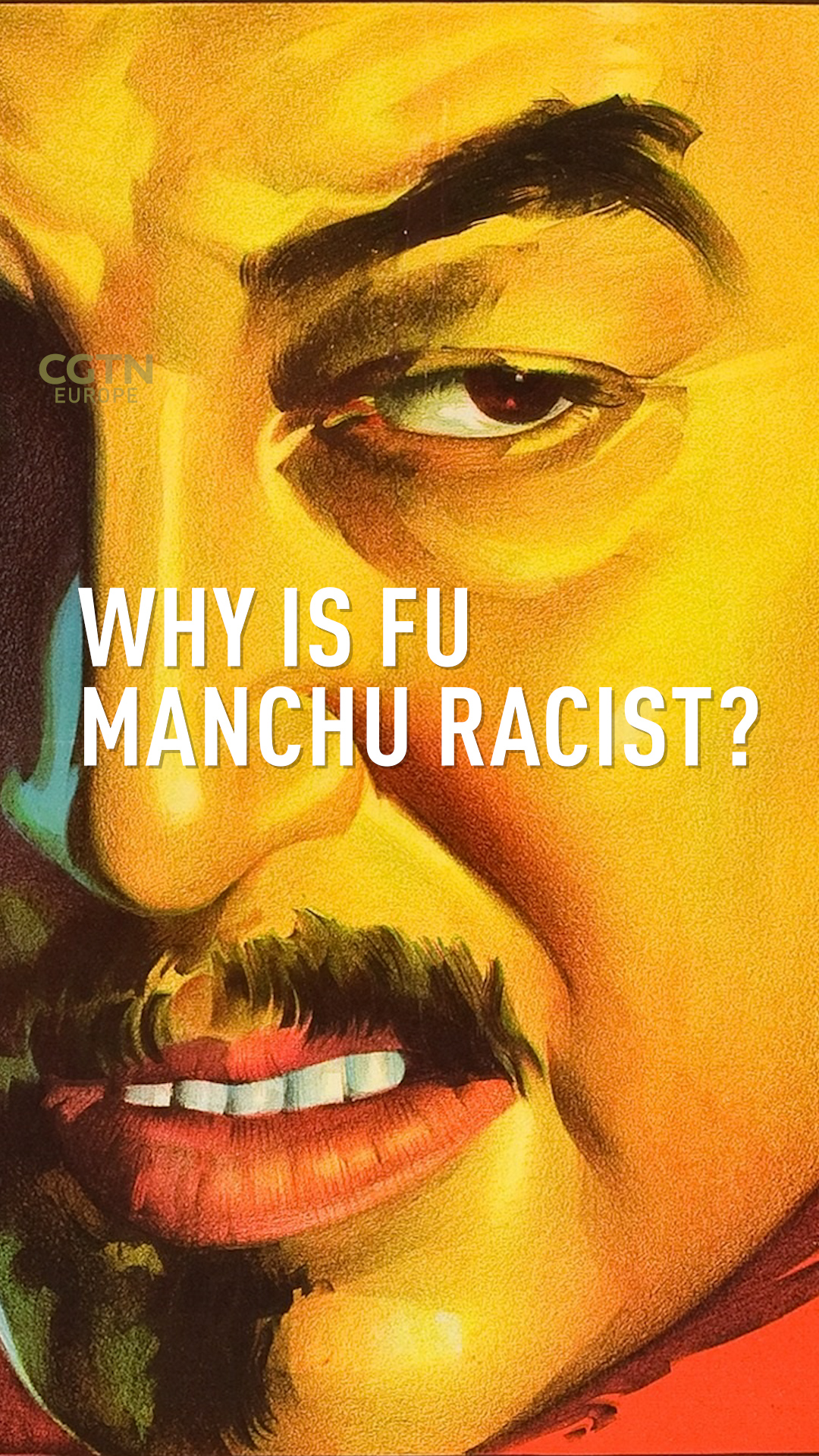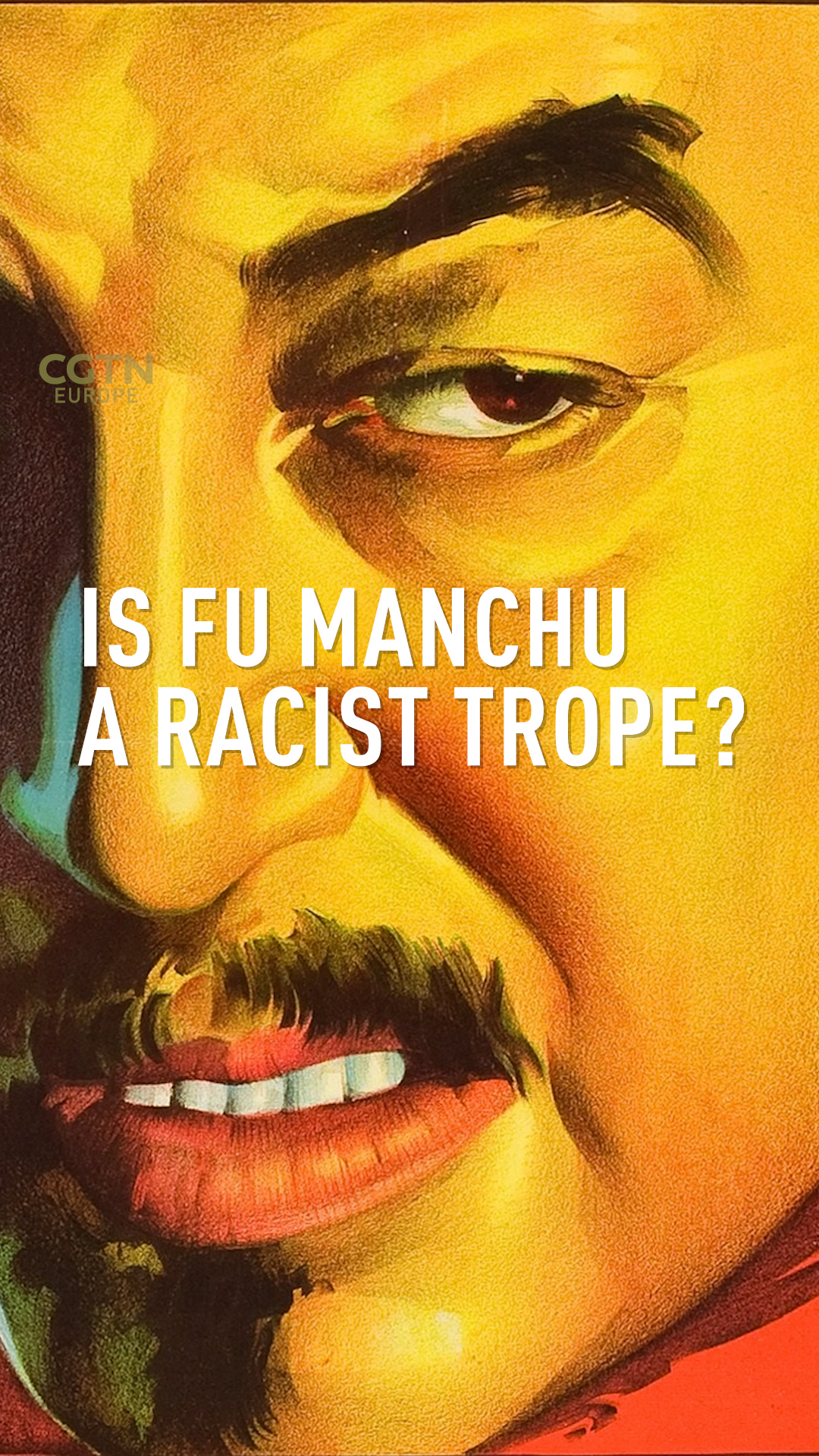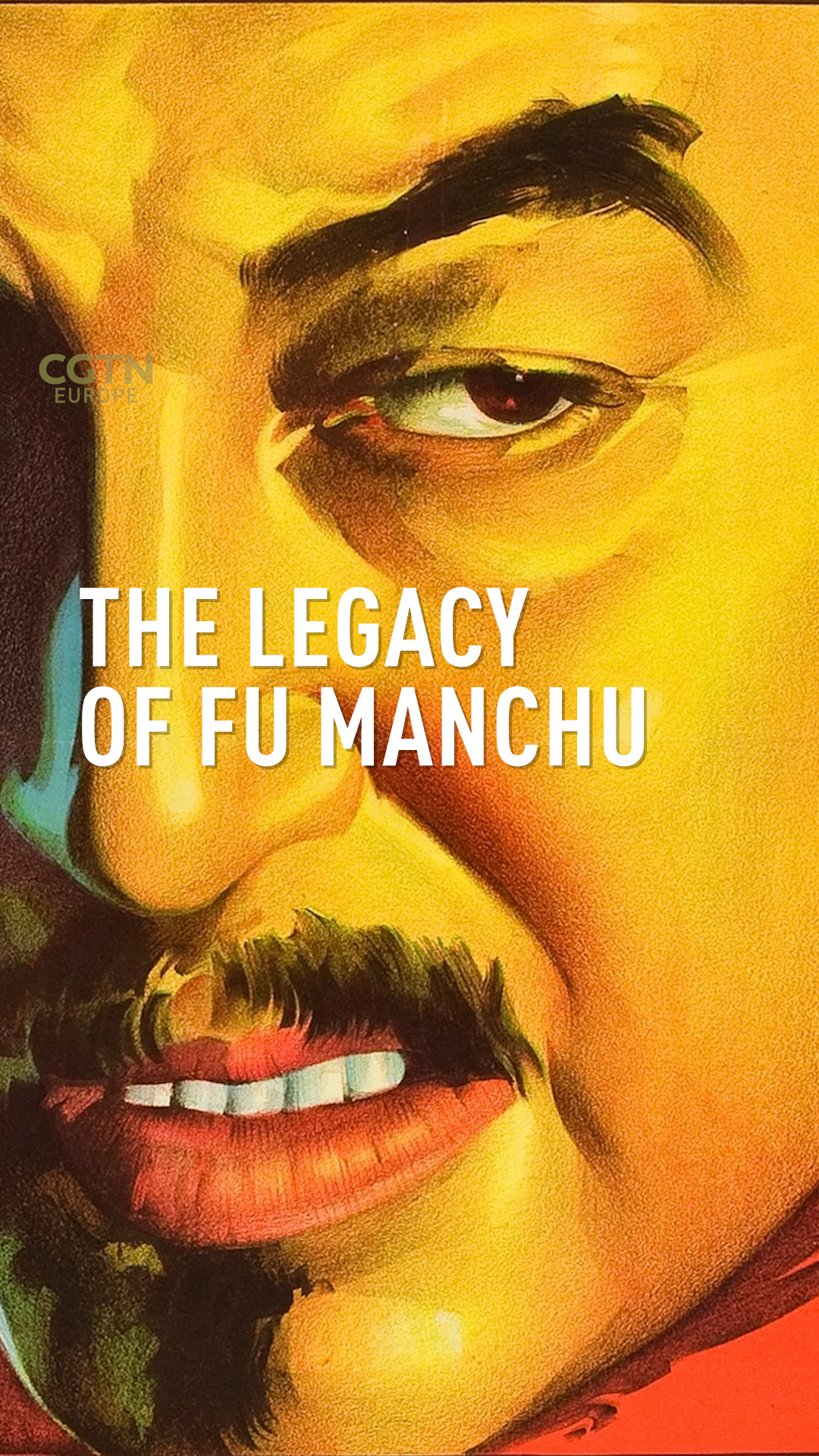01:29

When we think about racism in Europe and America we grapple with images of the slave trade, the horror of the holocaust and more recently Islamophobia. We think little about the problem of racism against Asians.
But in 2020, the outbreak of the COVID-19 pandemic saw an explosion of anti-Asian hate that took many in the West by surprise. Conspiracy theories about China's role in the pandemic were everywhere, being trotted out by world leaders and trusted media establishments.
Since then, China has again become routinely described as a 'threat' by media and politicians – and now old stereotypes are freely discussed amongst people who would not consider themselves racists. So how much of this is real and how much is based on anti-Asian racism that can be traced back hundreds of years?
The insidious Fu Manchu
Fu Manchu is a fictional character created by Arthur Ward, a music hall writer and journalist in London in the early 1900s. Writing under the pseudonym Sax Rohmer, Ward had absolutely no knowledge of Chinese culture or Chinese people – but his invention of a Chinese supervillain struck a chord in Victorian Britain and became a smash hit.
Fu Manchu was the original fictional Asian villain, a trope which became embedded in popular culture and Western psyche spawning spin-offs, spoofs, pop songs, video games and even consumer goods. But how damaging is Fu Manchu and how much can he tell us about modern Asian racism?
As a small-time journalist, Ward was on an assignment to London's Chinatown in 1912 when he saw a well-dressed Chinese businessman enter a downmarket teahouse – giving Ward the idea that would change his life.
Ward wrote Fu Manchu as the personification of the so-called Yellow Peril threat: exotic, alien and inhuman, a mastermind boasting degrees from top universities. Using sinister powers to control minds, he aimed to undermine Western civilisation.

Just an example of the Fu Manchu books available today.
Just an example of the Fu Manchu books available today.
At the time, London's Chinatown was in the dockside Limehouse area and home to just a couple of hundred Chinese people, predominantly seamen and their families. However, the story struck a chord with British society, says Jenny Clegg, author of Fu Manchu and the Yellow Peril: The Making of a Racist Myth.
"The origins go back to the Yellow Peril scares, which spread around America and Europe from the 1880s," she tells CGTN. "It's interesting to see how Arthur Ward used the kind of stereotypes that were fueling these scares in the character of Fu Manchu, who was portrayed as the leader of the soulless, unruly hordes from China."
China was in the global news: In 1911, Sun Yat-sen – a statesman still widely revered, and now known as the Forerunner of the Revolution – had come to power with the overthrow of China's last imperial dynasty. Established powers elsewhere in the world were uneasy at this change.
"The British banks and the financiers were expanding into China," says Clegg, "and then this sudden collapse of the Qing dynasty and the rise of a nationalist was seen as a matter of great concern."
Tapping into tropes
Fu Manchu – a powerful leader bent on world domination – was an extrapolation and exploitation of this fear. Before writing the character, Ward had never met a Chinese person, let alone been to China; his concoction was based on racial stereotypes from early visitors to China – missionaries, traders, soldiers and adventurers.
Ward was particularly besotted with Bayard Taylor, an American writer who believed in the pseudoscience of physiognomy – that human appearance and character are intrinsically linked. Taylor saw in the Chinese race "deeps of depravity so shocking and horrible, that their character cannot even be hinted."
01:07

Meanwhile, British traders and missionaries mistook Chinese Confucian restraint of emotional display to be indifference and even cruelty.
"This led to the idea that the Chinese were deceiving – they weren't being honest, they weren't revealing who they really are as people," says Clegg. "This spawned into stories of Chinese as cheats and liars and deceitful – never giving you the truth, always fabricating."
Imagine a person, tall, lean and feline, high-shouldered, with a brow like Shakespeare and a face like Satan, a close-shaven skull, and long, magnetic eyes of the true cat-green
- Sax Rohmer, The Insidious Dr. Fu-Manchu
Late 19th-century sensational fiction in the UK had sparked an obsession with so-called Chinese tortures; to this day, phrases like 'Chinese burns' (the twisting of the skin on the arm) and 'Chinese water torture' (in which the victim is driven to psychosis by slow dripping onto the body – a torture first described in Italy) remain widely used.
"These kinds of things still circulate," says Clegg, "and give rise to notions of the Chinese as being particularly brutal and using all kinds of repressive means."
Clegg also notes that religious missionaries had a fundamental reason to speak ill of the Chinese: "They didn't find it so easy to convert Chinese people into Christians, so this gave rise to the idea that the Chinese were soulless and not really human.
"All of these things accumulated together and they concentrated into this figure of Fu Manchu – the ultimate threat to humanity and to Western civilization."
Drugs and science
While few Chinese people lived in the UK, Britons were having more contact as trade grew between the nations, often on steamships predominantly manned by Chinese seamen.
That trade had also engendered another stereotype. In the 19th century Britain had fought two "opium wars" against China to enforce its right to trade the narcotic to Chinese people, often in exchange for goods popular back in Britain.
This drug-pushing was justified by blaming the buyers, says Clegg: "That the Chinese were particularly susceptible to drug taking. And this inverted itself into an association of the Chinese with drugs."

Boris Karloff in The Mask of Fu Manchu, 1932.
Boris Karloff in The Mask of Fu Manchu, 1932.
But if the British demonized the Chinese as drug users, they also distrusted intelligence. Fu Manchu was created as a sinister genius – a scientist, a doctor with degrees from top universities all over the world.
"He's a master not only of the occult but of Western sciences 'with all the modern technologies at his disposal' – a combination which makes him doubly threatening," says Clegg.
This also preyed on fears of the future in a world of rapidly advancing technology: "We know the power of science, which must be balanced with ethics to be put to good use – but what if science should fall into the wrong hands?"
And the Fu Manchu stories certainly show he is on a mission to change the world. From his base in London's Chinatown he plots to assassinate leading British politicians, scientists and diplomats to destroy the British Empire.
A powerful negative image
Deception, depravity, torture, drug addiction and sinister intelligence – it all adds up to a powerful negative image of the Chinese, says Clegg.
"These popular stereotypes went very, very deep into the white psyche, and were part of the creation of white identity from the beginning of the 20th century – an identification with race rather than with other identities like class."
Racist tropes were also widely prevalent against black people, but Clegg notes the novelist's masterstroke in heightening fears by creating a fictional figure who could threaten Anglo-Saxon hegemony.
"What Arthur Ward did was to give these non-white races a leader," she says. "That was what was so powerful – and that was what took off."

The Mask of Dr. Fu Manchu: 1951 Adventure Comic
The Mask of Dr. Fu Manchu: 1951 Adventure Comic
And take off it did: Over the next half-century Fu Manchu stories leapt from print to radio and on to Hollywood. Ward made so much money that he took to signing his name with a dollar sign. But the evil-genius trope was so popular that the police became suspicious of British Chinese communities, says Clegg.
"There was an investigation of the Chinese community in Liverpool, trying to find out if they were all dealing in drugs and running gambling establishments – and the investigation found absolutely nothing.
"They were law-abiding, there were many Liverpool women who were happily married to a Chinese man and said they were good husbands. They couldn't find anything."
But suspicion still grew. "It continued to build up into this terrible hunt of Chinese leaders and businessmen. People were repatriated. It was damaging to the Chinese community – they had to keep their heads down."
WATCH: The Secret Betrayal – How the UK ejected the Chinese WWII sailors who had risked their lives
LISTEN: The Secret Betrayal podcast series
The stereotypes persist
Does the sinister shadow of Fu Manchu still linger, a century after Ward's first book? Clegg detects a significant lasting legacy.
"We see it today – the reporting in the media, in what politicians are saying about China: They're saying 'The Chinese will take over the world.' You go back to the stories of Fu Manchu 100 years ago, and the Chinese were supposed to be taking over the world."
She also notes the reappearance of the 'sinister scientist' trope. "Fu Manchu had degrees from universities all over the West, and he was always experimenting with drugs and potions to hypnotize and control people's minds. And this feeds directly into the Wuhan lab theory – it's so blatant the way these themes are regurgitated."
00:36

Men of Asia! The skies are red with the thunderbolts of Genghis Khan! They rain down on the white race... and burn them!
- Boris Karloff as Dr. Fu Manchu in The Mask of Fu Manchu (1932)
Clegg believes this still affects Chinese people living in Europe and the U.S. today.
"They're seen as accomplices and have to be kept under surveillance," she says. "The Confucius Institutes in our universities are swamped with paperwork, in freedom of information. You know that it's a very, very difficult situation for people."
Clegg also sees Fu Manchu's influence lingering in the attitudes of today's world leaders.
"Rishi Sunak talking about 'The Chinese have a different value system' – the implication is that they're a threat to our values… the threat is to Western civilization. This is a theme directly from Fu Manchu."
READ MORE: What's it like to be Chinese growing up in the UK?
Exorcising the phantom Fu Manchu
Of course, racism is nothing new. Jenny Clegg, author of Fu Manchu and the Yellow Peril: The Making of a Racist Myth, believes we should read our history so we can make sure we're not falling for age-old racist stereotyping.
"What people should do is examine what is going on with these kinds of stereotypes," she says. "Learn more about the Fu Manchu myth and where it came from. Because it's powerful to contrast the image that's being portrayed in the media that China is determined to take over the world – this idea has got roots that go back 100 years, it's not something new.
"We really need to distinguish fact from fiction and understand that a lot of what is being portrayed is more a regurgitation of our old ideas and misperceptions rather than anything that is really about China and Chinese people."
The ancient cultures of Europe and China are indeed different, but conflict is not inevitable as long as we can try to see the similarities between people and the values that other communities share.

Fu Manchu illustration. /Joseph Clement Coll
Fu Manchu illustration. /Joseph Clement Coll
Far too often – and arguably increasingly so in the age of social media – humans focus on differences rather than similarities. Using those differences as the basis for assumptions of superiority is a dangerous thing; as author Ian Leslie points out in his book Conflicted: Why Arguments Are Tearing Us Apart and How They Can Bring Us Together, "Behind every disagreement is a clash of cultures that seem strange to each other. Don't assume that yours is the normal one."
For Clegg, the greatest weapon against 'othering' people is personally making an effort to understand the real China and real Chinese people.
"There are differences, but that doesn't mean to say that Chinese people are evil or Chinese people are a threat – they just do things differently," she says. "The fact that the Chinese go about doing things in a different way, it can be enriching and rewarding and we need to learn more.
"And we need to get to know China better because there are so many things that we have in common. We share the planet and live together in a globalized world."
Titan Books, which still publishes Fu Manchu titles, declined to comment for this article.